Students, social media and surviving cancer
In the following 15 minute read, Head of Marketing, Emma interviewed four young people who have had cancer. They discuss social media and how their journeys were impacted by the never-sleeping bustle of digital friendships and followers.
As a soon-to-be 30-year-old, social media is something I *used* to be right on top of. Pumped for the creative possibilities of ‘Boomerang’ (which is now just a bit annoying) or smug from the overuse of my fave filter – I’ve been guilty of sharing only my best life as I enter the glossy gates of Instagram.
But things have changed. There’s a swelling wave of critique around the opportunity social media provides – to edit and curate our lives for others to observe, judge, maybe even aspire to. Due to the monotonous conversations that permeate both media and everyday life, I won’t labour this point. However, please note that throughout the conversations that follow, this ‘opportunity’ is a recurring bad taste in the mouths of young people when discussing good ol’ social media.
Last May I started working here at Reason and of course, digital is our thing. We read about it, build with it, talk about it. We love it. However, in the last 9 months, I’ve come to see that even more than digital, people are our real thing. Through our work I spend time with people facing, what I’d consider to be, not your ‘everyday’ challenge; recovering from addiction, living in poverty or living with Parkinson’s. In particular I’ve found myself getting to know some young people who were diagnosed with cancer at a troublingly young age.
While the world talks about how the average Joe/Jo is affected by social media, I wanted to understand how a young person on a traumatic, untrodden path is affected by that same digital environment. Is social media a tool that builds new connections? Does it amplify the craving for support when isolation sets in? Or does cancer take the pressure off projecting the perfect image online because living has become more important? I had no idea, so I thought I’d speak to some people who did.

Four people, four lives changed
Meet Bradley (25), Seren (23), Phoebe (20) and Jack (26), four frank and unusually self-assured young people whose lives have been changed by cancer. During our conversations they spoke openly to me about their relationship with social media during key stages in their journey – diagnosis, treatment and life ‘post-cancer’. Listening to their stories and learning how these platforms, which are often labelled a stage for vanity, played a part in this impossible period of life painted a picture so bright and so dark it would make Caravaggio weep.

I want to thank each of them sincerely for taking the time to share, particularly on behalf of others going through something traumatic who may be disappointed in themselves for using social media to:
1) Live a double life because cancer ain’t #pretty.
2) Find where I belong.
3) Remember my journey as it happened.
I’m only 19, why does my body feel like it’s falling apart?
Bradley’s experience began after A levels. At 19 years young he was suffering from a host of symptoms; bloated stomach, swollen spleen with a skeletal, malnourished appearance. “I had chronic fatigue, my hair was straw-like and without warning, I would get stabbing pains in my ribs, where my spleen was. I kept thinking, why do I feel like this? I’m only 19 – why does my body feel like it’s falling apart?” Bradley remembers the date – 13th June 2013. Chronic myeloid leukaemia was the diagnosis.
23 years old, Seren – now Creative Awareness Lead at the cancer charity CATS – will relate. At 19, in her first year of university she was diagnosed with ovarian cancer. I can’t imagine at that stage in life dealing with something like cancer. Remembering to pick up my laundry was a challenge for me back then.
Phoebe, now a 20-year-old linguistics student at Newcastle University, was diagnosed with a genetic condition called Familial Adenomatous Polyposis (FAP) at the age of 13 years old. Phoebe explained, “it has come to define my medical life and makes me prone to cancerous polyps throughout my digestive system.” That year, Phoebe underwent drastic surgery to remove her large intestine.
And then there’s our friend Jack – 26 year old founder of ballsy charity, Baggy Trousers UK, who five years ago was diagnosed with stage two testicular cancer, with the bonus news that the cancer had also spread to his abdominal lymph nodes.
To recap, we’ve got four people – all young, ‘normal’ people who have had their life stop in front of their eyes. And it’s happening at an age when you’re all about school, friends, parties and the ever growing, never sleeping world of social media.
1. Living a double life because cancer ain’t #pretty
For Bradley, months of chemo and drug trials followed his diagnosis. Despite being exhausted by the process, I was astounded to learn that during this time Bradley took on internships at Liberty, Conde Nast, Burberry and finally, the crème de la crème, British Vogue where he ended up working part-time alongside doing a degree, of course. Bradley took to his Instagram feed, updating audiences on all the latest looks, fashion week and his (genuinely) fabulous hair. Follower numbers were rocketing but at what cost?
I was in this world that I adored but it was very isolating. It’s beautiful and I was driven, but the conflicting lives drained me. Every Monday, I was in hospital living as a cancer patient and the rest of the week, I had to be on social media being like, ‘Look world, life’s perfect!
Despite managing two lives, Bradley was mostly positive and, quite frankly, absurdly proactive, volunteering with the CLIC Sargent Young Person Reference Group using his social influencing skills to grow their digital presence. Bradley was responding to medication and life was coming together. “At the beginning of 2016 I took a leaf out of a friend’s book. She has a blue tick, 1.2 million followers on Instagram.” Bradley explained. Obviously, I’ve checked this friend out. She’s exactly the type of social influencer I’m fascinated (and intimidated) by. As I scrolled through, I was drawn to an immaculate snap of her outside the Louvre with 40k+ likes and a cascade of effusive comments. You can hardly see the famous Parisian landmark but who’s looking at anything but her? Bradley’s point here was a compelling one. He explained how his friend was cautious about how much of her face she shows in photographs and as a result ‘in real life’ people rarely recognise her. Bradley replicated this method but for his own scenario. He kept his cancer private.
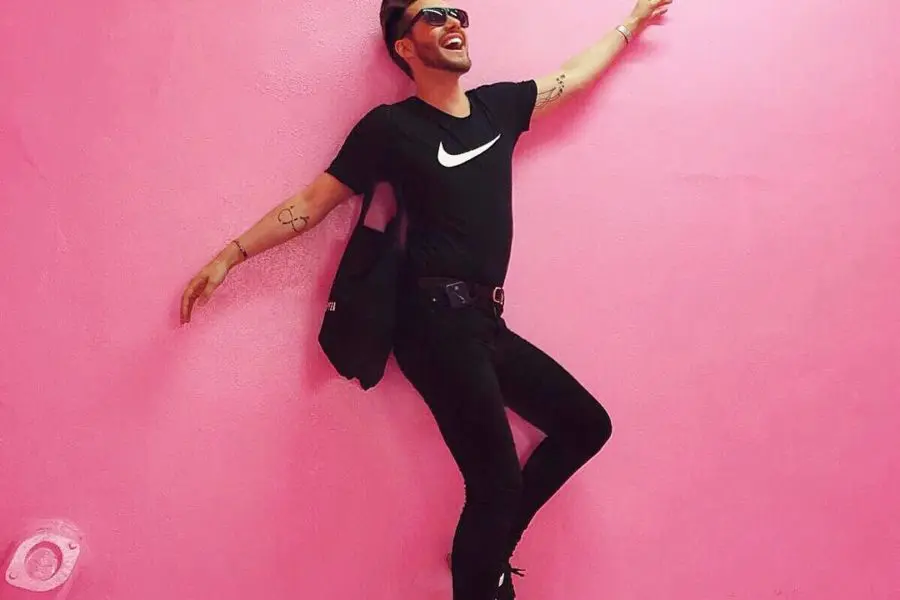
“I didn’t want to be open about it. People are fascinated by cancer.”
I agree. I’d be a hypocrite if I didn’t. Me writing this is a perfect example of our fascination with how the body attacks itself. The fact that top national media titles wanted to adopt this story when we shared the idea with them is only further evidence. Bradley didn’t want that association. He had achieved a lot but “straight away they want to know about the cancer, not the British Vogue work” so the two lives were kept apart. He volunteered with CLIC Sargent, but for the hordes of followers who didn’t know him he kept it vague – kept it ‘Vogue’ – nobody knew he was a service user. Bradley explained, “I was happy being smoke and mirrors – it enabled me to hide who I was. I didn’t want to live with cancer all my life.”
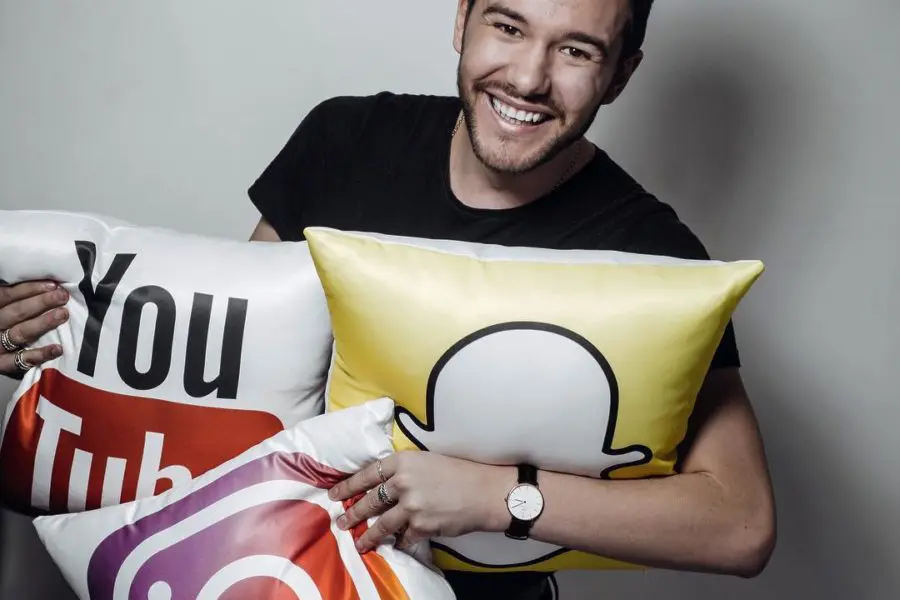
But living a double life eventually became trapping and Bradley felt like a fraud. He told me, “I was exhausted. I had a fear of the cancer label when I don’t look like a cancer patient! I was taking lovely photos of myself with lovely hair. People would think ‘it can’t be possible’ but managing two contrasting lives was mentally damaging.”
And then, “everything went tits up.”
No alternative
In August 2017, Bradley got the news that his medication had stopped working and there was no alternative. He needed a bone marrow transplant which meant leaving his beloved job to spend two months in hospital. Bradley needed to plan. “Before the transplant I planned content that I could post during my recovery. Once per week until my hair grew back and then I could be up and running again.” It’s unfathomable to me going through something as distressing and debilitating as a bone marrow transplant, that anyone would still put thought into a social media schedule – guess that’s why I’ll never have a blue tick. Bradley had worked hard to curate his feed and generate a following. Instagram was his work – was he going to lose that to inconsistency now?
After Bradley’s operation, something changed.
He shared a real, raw photo of himself in his hospital bed – which became his most-liked post to date. “It was no longer a hidden disability. I was wearing cancer.” Bradley told me.
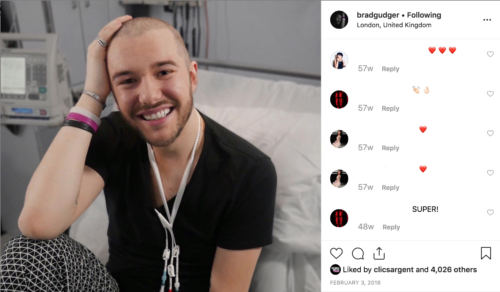
The time spent in the hospital bed became an important period of change where issues such as weight or hair were dwarfed by the question, “am I going to die?”. Bradley suddenly welcomed scars, warts and all as he asked himself, “why am I doing this? I can’t be bothered anymore. It’s time to go public.” Bradley’s two worlds collided and so much positivity was born out of it. Bradley was cancer free, but he was also free of his own pressure to maintain the distance between himself and himself with cancer. I can’t say for sure why this revelation happened but getting to know Bradley and what he’s achieved since, I feel so grateful that it did.
2. Finding where I belong
With 620 Facebook groups dedicated to breast cancer alone, it is evident that there is a demand for social media groups centred around cancer. Bradley, Seren, Phoebe and Jack all expressed how pivotal joining a group was to them at a time when they felt uncertain about where they belonged. A fear of missing out on beautiful normalities of everyday life was something that resonated with each young person. The statement, “I felt isolated” is one that I heard more often than any other during our talks as loneliness became universal in all four lives.
Seren talked about how during her time in hospital she felt like she was missing out. As an outpatient at the Teenage Cancer Trust ward, she didn’t spend enough time in hospital to be around other cancer patients on a regular basis. You’d assume being an outpatient is a good thing because you’re not ‘stuck’ but for Seren it meant she wasn’t there long enough to bond with people who were experiencing the same things she was.
Friends posting on social channels meant that she witnessed nights out and memories being made from afar. Her participation in her friends’ digital world was dimmed by the effects of her treatment. “When you’re on morphine you don’t have the energy or will to look at a bright screen, so it just wasn’t something I interacted with much.” Seren explained. And why would you? There’s the constant battle of trying to keep up but doing so makes you miserable. Without cancer that battle with social media can be challenging, but with it? I dread to think.
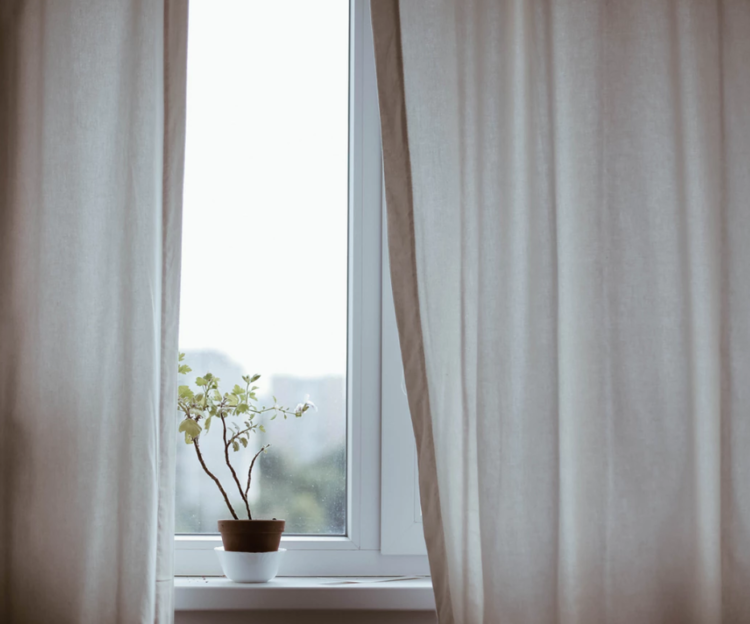
FOMO
When discussing FOMO (fear of missing out) Seren told me it went beyond emojis and ‘Stories’. It became more primitive than that. “Social media removed, I always used to look outside at the nice April sun and wish I could go out.” It became evident to me that treatment left a gap in young people’s social lives on and offline. When you’re too damn drained and sick to look at your phone or you haven’t got the energy to explain how you’re feeling to each person asking, this gap grows even bigger.
Jack echoed this. He told me how well-meaning people expressing concern about him on social media made him feel pressured to keep others updated about his condition which eventually became too much to handle. “I was constantly asked if I was alright and how I was doing,” he said. “I got fed up of repeating the process over and over. It became overwhelming, to the point where I just turned my phone off and left it at home whilst at treatment.”
Jack said he felt “old enough to understand what was happening, but too young to handle the physically and mentally challenging experience”. Turning to Facebook he found people he could talk to about what he was going through. He joined a group for survivors of testicular cancer and found comfort in a relatable community some of whom have since become “lifelong friends.”
Joining a group was one of the best things I did as I could ask the opinion of others who have been in my shoes and know exactly how I feel.
Phoebe relied heavily on finding solace through social media after becoming isolated from her school friends early on. Throughout treatment this isolation was magnified as Phoebe was ‘lucky’ enough to keep her hair, unlike most of the people around her. Phoebe’s privilege kept her at arm’s length from the community she’d fallen into through no choice of her own, unable to connect with those going through the daunting process of losing a part of themselves. Where did she fit?
Social media became part of the answer but not all platforms provided equal relief. Phoebe described Twitter and Facebook as “a lifeline, where I could vent my frustrations”. She explained how “liking other cancer patients’ tweets was so touching and personal.” It was something that made Phoebe feel normal while she remained “impersonal about my diagnosis to the rest of the world.” Joining the Teenage Cancer Trust group on Facebook provided a safe and relatable community making Phoebe feel that she “still had a social purpose and something to contribute.”
Not to rain on social media’s parade but credit cannot be given to social media as a whole. Instagram for example, only damaged Phoebe’s sense of belonging: “I didn’t want to see ‘fitspiration goals’ when I was so fatigued and ill that I could barely get out of bed. My weight had plummeted to 49kg.”

3. Remembering my journey as it happened
‘Over-sharers’ – everyone’s got an opinion. We’re often too quick (myself included) to roll our eyes at those divulging their personal lives on social media, but these conversation have made me think… if we just took a moment to remember there’s a person behind the post that reached out publicly for a reason, we may all react differently.
During our conversations, Seren reflected on her social media footprint and how she wishes she’d shared more during this difficult period. Posting only one or two photos of herself during treatment, if she lived it again Seren would choose to diarize the experience with an aim to recognising and sharing what she overcame. She explained, “it’s important to remember what you got through” particularly because of one unavoidable side effect of treatment, ‘chemo-brain’ (the second-most common term I heard during my chats). Chemo-brain brings about a strange fog of forgetfulness which created gaps in Seren and so many others’ memories.
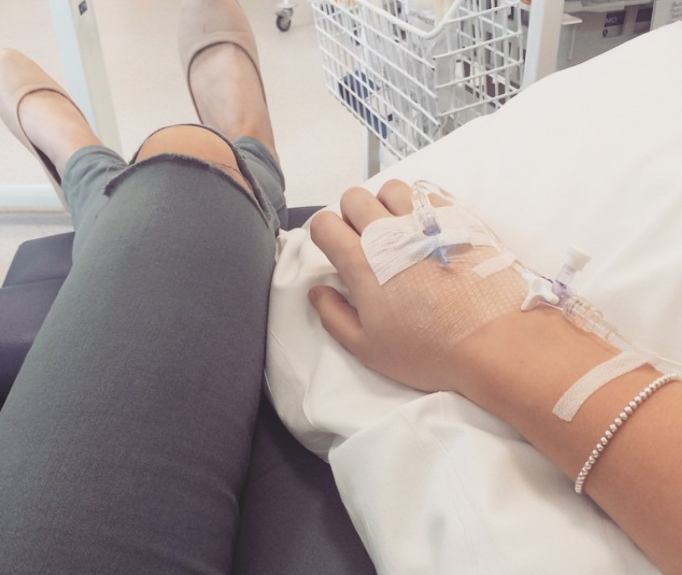
A photo of her feet whilst on chemotherapy was the closest Seren got to sharing publicly until she finished her treatment and checked into The Christie on Facebook to publicly thank the team there for what they’d done for her. But as her health improved Seren felt ready to embrace the journalistic side of social with an aim to educate others on the threat of cancer. “I had a carcinoma which isn’t the most common type of ovarian cancer in young people. It’s a good idea to raise awareness, showing others that this can happen to young people.”
From conversations with Phoebe, I could tell social media raised a lot of conflict for her, not just internally but externally amongst friends and family. She wanted to share her story but wasn’t getting the reception that we’d all hope for. Close family and friends would brand it ‘attention seeking’ which initially hits me hard in my gut, but as I think back to my initial point around eye-roll culture – I’m not totally surprised. “I posted on Instagram on the day of my first chemo,” Phoebe told me. “I felt like the post validated the fact I had cancer. There was photo proof and no one could tell me I was lying for attention which still happened frequently, regardless.”
For Phoebe the process of sharing her story online was an essential coping mechanism. Despite criticism she didn’t waver, continuing to use social media as an outlet. Phoebe set up a Twitter account (Not Just a Statistic) and a JustGiving page to document her cancer journey and fundraising efforts. At last, attitudes seemed to shift. “People at school told me how brave I was and that I had inspired them to be more open about their own invisible disabilities,” she said. “It made me feel liberated and that I shouldn’t have to hide what I was going through any more.”
But Phoebe wasn’t the only one to benefit from her transparency online. Her story had made an impact on strangers. “Followers would comment or message me to say I had made them feel more normal about their diagnosis or able to break down barriers and talk to their family and friends about their journey.” She had found her purpose and was becoming confident that she could really make an impact through her diagnosis.
The final stage and where I hope you remain
The challenges and learnings shared by these four young people have a lot in common. But I soon realised there was one thread so powerful and dominant running through each journey that I’d been taking for granted the entire time. At some point in their story, Seren, Bradley, Jack and Phoebe became empowered. They were ready to proudly own the disease that owned them for so long.
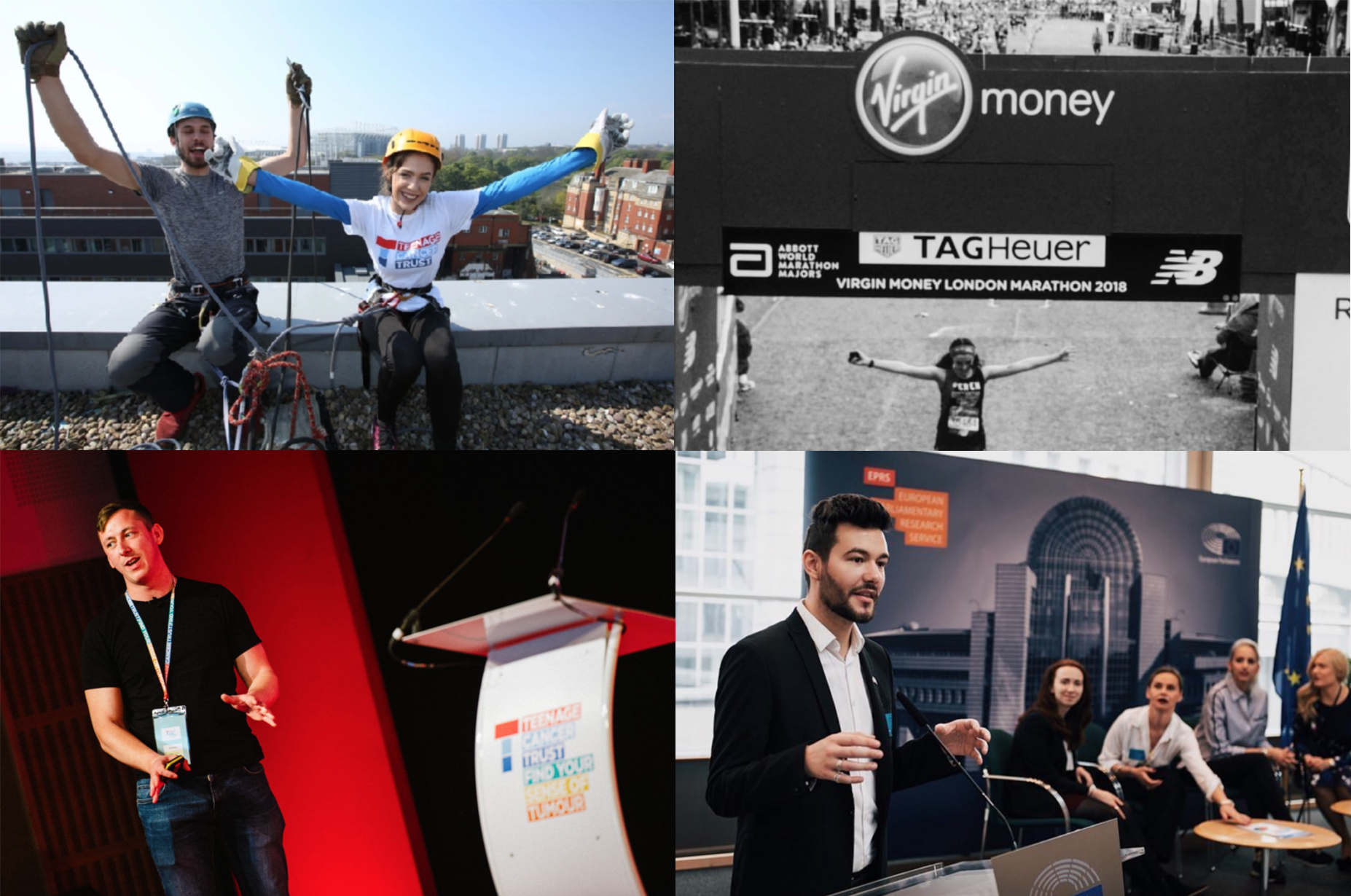
Phoebe, at just 20 years old, raised over £10,000 for Teenage Cancer Trust. She is a winner of the Diana award and an ambassador of Climbing Out, a charity which provides outdoor activities for young people who have experienced injury or illness.
Seren ran the London Marathon for CLIC Sargent, has shared her experience on the BBC and is currently raising awareness at CATS, a charity that educates young people about the symptoms of cancer.
Jack founded Baggy Trousers UK, a charity which supports survivors of testicular cancer. He advocates fiercely around the world about self-examination plus, because clearly he has too much free time, Jack is a trustee of charity, The Robin Cancer Trust.
Finally, Bradley – influencer turned advocate. Bradley is a CLIC Sargent ambassador and technical advisor at the World Health Organization (so major, it requires U.S. spelling). He is also setting up his own charity, founded with a friend from his hospital bed, to help people build connections when living with cancer.
Thank you so much Bradley, Seren, Jack and Phoebe for letting me in and being empowered enough to be brutally honest. In a world where we’re conditioned to portray perfection, I can’t express how refreshing it is to meet four smart, young people unafraid to talk about life as it actually was.
